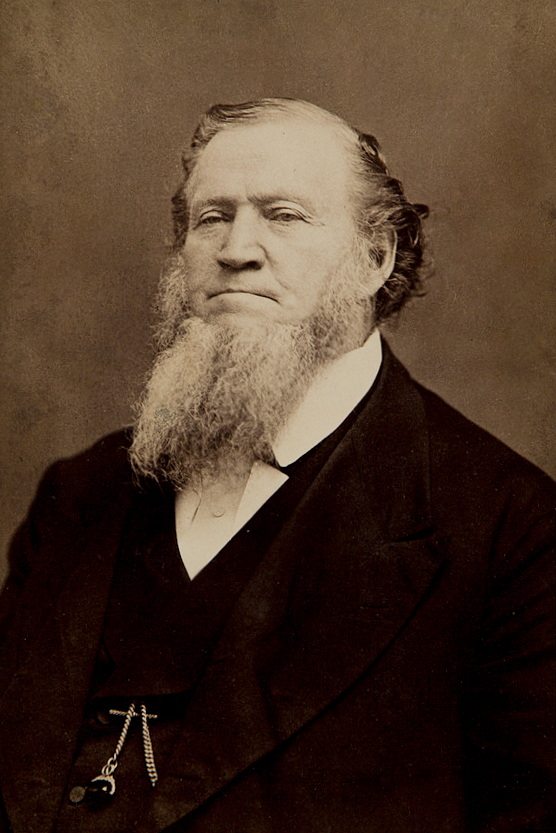Journal of Discourses 13:143 (July 11, 1869)
1860s
Famous Brigham Young Quotes
Journal of Discourses 12:262 (Aug. 9, 1868)
1860s
Journal of Discourses, 9ː150 (January 12, 1862)
1860s
Journal of Discourses 3:224 (March 2, 1856)
1850s
Journal of Discourses 3:266 (Jul. 14, 1855)
1850s
Journal of Discourses 14:196 (June 3, 1871)
1870s
Brigham Young Quotes about God
Journal of Discourses 3:247 (March 16, 1856)
1850s
Journal of Discourses 1:50-51 (April 9, 1852)
This concept is commonly referred to as the "Adam–God theory."
1850s
Journal of Discourses 2:170-171 (February 18, 1855)
Young comments on Joseph Smith’s visions. This quote is often presented in a heavily edited form which reads: "The Lord did not come…But he did send his angel to this same obscure person, Joseph Smith Jun.,…"
1850s
Journal of Discourses 4:219 (Feb. 8, 1857)
1850s
Journal of Discourses 7:285 (October 9, 1859)
1850s
Brigham Young Quotes about people
Journal of Discourses 1:88 (June 13, 1852)
1850s
Journal of Discourses 2:179 (February 18, 1855)
Young predicts that people will take his written words and rearrange them to suit themselves.
1850s
It will be so.
Journal of Discourses 7:15 (July 4, 1854)
1850s
Journal of Discourses 13:300 (Nov. 13, 1870)
1870s
The Life Story of Brigham Young, p. 149-150
Attributed
Journal of Discourses 2:311 (July 8, 1855)
1850s
Brigham Young: Trending quotes
Journal of Discourses 2:186 (Feb. 18, 1855)
Young's response to those that persecuted the Mormons in Missouri and Illinois.
1850s
Journal of Discourses 8:354. (March 3, 1861)
Young comments on Joseph Smith, Jr.’s First Vision
1860s
Journal of Discourses, 1:188 (June 19, 1853)
1850s
Brigham Young Quotes
Journal of Discourses 18:231 (Sept. 17, 1876)
1870s
Journal of Discourses 9:102 (January 5, 1860)
1860s
Deseret News, 317 (December 9, 1857)
1850s
“Never let a day so pass that you will have cause to say, "I will live better to-morrow,"”
Journal of Discourses 8:140 (August 5, 1860)
1860s
“Now, there is no harm in a teapot, even if it contains tea, if it is let alone.”
Journal of Discourses, 12:28 (April 7, 1867)
Young discusses the Mormon prohibition against drinking coffee and tea, known as the Word of Wisdom.
1860s
"Journal of Discourses", 4:56(Sept. 21, 1856)
1850s
Journal of Discourses, vol. 2, 1863, p. 172.
1860s
Journal of Discourse 2:6-7 (October 23, 1853)
1850s
Journal of Discourses 1:83 (March 27, 1853)
Young describing his feelings upon awakening from a dream in which he "saw two ruffians, whom I knew to be mobbers and murderers, and they crept into a bed, where one of my wives and children were..."
1850s
Journal of Discourses 12:67 (June 23, 1867)
Young’s recollection of religious excitement and events leading up to Joseph Smith, Jr.’s first vision.
1860s
Journal of Discourses (1854), ed. G. D. Watt, Vol. 1, pp. 109–110 ( scanned image http://contentdm.lib.byu.edu/cgi-bin/docviewer.exe?CISOROOT=/JournalOfDiscourses3&CISOPTR=9599)<!-- emphasis and unclosed quote mark in original -->
Young’s comments regarding criticism of Joseph Smith, Jr. and Mormonism.
1850s
Journal of Discourses, 13:271 (July 24, 1870)
1870s
Journal of Discourses, 4:219 (February. 8, 1857)
Brigham Young describes the doctrine of Blood Atonement
1850s
Journal of Discourses 13:174-175 (May 29, 1870)
1870s
Journal of Discourses 11:269 (Aug. 19, 1866)
1860s
“For their abuse of [the Black African] race, the whites will be cursed, unless they repent.”
Journal of Discourses, Vol.10, 1863, p. 110
1860s
Journal of Discourses 12:262 (Aug. 9, 1868)
1860s
Journal of Discourses, 1:187-188 (June 19, 1853)
1850s
Journal of Discourses 8:140 (August 5, 1860)
1860s
Journal of Discourses 14:195 (June 3, 1871)
1870s
Journal of Discourses 18:239 (June 23, 1874)
1870s
Deseret News: Semi-Weekly, 1 (30 June 1874)
1870s
Journal of Discourses 3:222 (March 2, 1856)
1850s
Journal of Discourses 4:53 (September. 21, 1856)
Brigham Young describes the doctrine of Blood Atonement
1850s
“Honest hearts produce honest actions.”
Discourses of Brigham Young, p. 232
Attributed
Journal of Discourses, vol. 7, 1863, p. 290.
1860s
Journal of Discourses 14:226-227 (August 27, 1871)
1870s
Preston Nibley, Brigham Young, the Man and His Work, 128.
Attributed
Words spoken by an actor portraying Young in the movie September Dawn, an account of the Mountain Meadows massacre. This exact statement has not been attributed to a known source, and may be a paraphrase of a statement made by Young on March 2, 1856: "The time is coming when justice will be laid to the line and righteousness to the plummet; when we shall take the old broad sword and ask, "Are you for God?" and if you are not heartily on the Lord's side, you will be hewn down." (Journal of Discourses 3:226)
Misattributed
Journal of Discourses, 3:247 (March 16, 1856)
1850s
